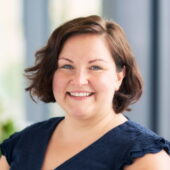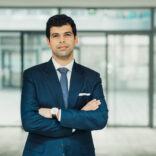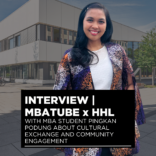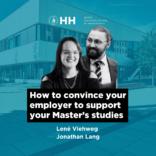
Success Story Interview with Aman Khan, Data Scientist | Project Manager at Allianz SE Germany
Career update: Since June 2022 Aman Khan is working as Associate Director, Data Science at Merck
Aman Khan, MBA graduate at HHL, shares his story right from his start in the MBA program up to becoming a Data Science Manager at Allianz in Germany. In this interview, Aman is sharing both his personal and professional experience on how to successfully enter the German job market after graduating.
What is your current job position like at Allianz SE?
Currently, I work as a Data Science Manager at Allianz SE. As the lead data scientist and a project manager, I enable the use of technology to, from the firm’s perspective, make decisions more transparent and data driven, and from the customers’ perspective, make their experience with us seamless, information-rich, and personalized. Allianz fosters ideation and its impact, which has allowed me to pitch ideas to several boards and board members, implement projects that have a firm-wide impact, and present and share these ideas with teams, globally.
After a wonderful time at Allianz, I would be soon joining as an Associate Director/Global Business Innovation at Merck, where I wish to make a similar impact.
Just because you are doing something different, does not necessarily mean it’s wrong. There is no right path to follow, but just your own.
Could you share some glimpses of what to expect in your new position at Merck?
From the interviews and the initial conversations with the leadership, I expect the projects to have higher complexity and stake as I would be shifting my focus from the German market to a Global one.
I would also be moving away from having all of my team in one city, to a team operating out of different countries. This excites me, as this would make discussions rich with a variety of perspectives and indeed also bring forth some interesting new challenges, which I look forward to tackling head-on!
One of the best perks of an MBA is that it opens doors for you in a lot of industries. Consequently, I had prepared myself to be open to all, especially new experiences
What was your strategy for successfully entering the German job market after your MBA?
One of the best perks of an MBA is that it opens doors for you in a lot of industries. Consequently, I had prepared myself to be open to all, especially new experiences. I got to interview at a lot of Banking, Finance, and Insurance companies, in addition to where I would normally apply, i.e., Tech Firms. A lot of traditionally non-tech firms, at the time, were leaning into Digital Transformation and building in-house Tech/AI competencies, and that’s where I eventually found that I could add the most value.
Not a strategy per se but keeping options open helped me re-evaluate my skillset and eventually led me to a new function that fit me better.
Best-practices and stories on how to enter the German job market
What specifically made you decide to study in Germany and why at HHL?
For me, choosing a business school with a global, diverse cohort and a smaller class size was essential. The other schools on my list claimed the former but almost always lacked the latter. HHL also attracted me with its successful alumni, many of whom have established successful/ultra-successful businesses or are high-level corporates. The statistician in me could only think, that with such small batch sizes, the law of averages couldn’t have kicked in, and indeed I would be joining a remarkable group.
After going through the experience, I couldn’t be happier with my decision. During my time at HHL, I felt the individual attention given to me by Professors, Staff, and Career Services. I also met some amazing people and lifelong friends thanks to HHL.
Did you know that Germany’s visa regulations are very favorable for international students looking to enter the German job market? After completing your studies, you can apply for a range of options, including:
- 18 months job seeker visa, which gives you plenty of time to find the right career path for you,
- a work permit if you already have an offer,
- apply for an 18-month job-seeker visa, which gives you plenty of time to find the right career path for you, especially considering our graduates’ employment rates.
Why did you decide to select the fast track when most students opt for the advanced track? Has this been an advantage for you?
My primary intention for choosing an MBA was not a career change, but rather an advancement. I was looking to be more rounded up in my skill set. From this standpoint, the core courses provided by the Fast-Track program felt sufficient for me. Juggling an intense course load, German classes, and a job search also pushed me to be more spontaneous and manage my time better.
This decision also helped me re-enter the job market quicker and with a smaller gap between jobs, which I have felt to be advantageous for me, as the tech/data-science industry tends to move at a much faster pace.
During my time at HHL, I felt the individual attention given to me by Professors, Staff, and Career Services. I also met some amazing people and lifelong friends thanks to HHL.
Do you have any advice for those who are considering an MBA?
Yes, I was a student ambassador for HHL for a couple of years and I came across two kinds of potential candidates, the ones who got an admit and the ones who hadn’t done extensive research.
My advice is to do thorough research based on your career and personal goals if this is an endeavor worth taking. One aspect that most people miss out on is not thinking beyond the program, the time spent researching different business schools is important, but what is more important is to analyze the job market and see if there is demand for your profile (+ the value add of an MBA). Finally, an MBA, although valuable, can’t offset industry experience. For people looking for a career change, MBA may need to be supplemented by an internship to get the desired role.
What were the challenges you experienced and how did you overcome them or how did they help prepare you for your future work?
The one big challenge I faced, specific to my situation, was that I entered the program quite young. Having relatively less experience, and a profile quite different from my cohort, it was hard for me to discuss the job prospects with my peers. I couldn’t also find myself to be a good fit for a lot of firms that visited the campus, with me lacking the work experience pre-requisites, with sometimes it not being enough and other times it not being the “right” work experience.
Although discouraged at first, I actively started networking and applying for jobs and internships very early on. After the first few months of being part of networking events, and a lot of interviews, I gained confidence in the value I offer, and before the end of the MBA program could successfully get a couple of job offers. My learning from this experience was, just because you are doing something different, does not necessarily mean it’s wrong. There is no right path to follow, but just your own.

Hello there, I'm Ellen and international education and student mobility is my thing! I did my first language course in the UK at the age of 14 and I have been an exchange student in Denmark at university. I have lived in Malta and Ireland for 15 years to work with international students and support them on their individual and exciting journeys to improve their education. I joined the HHL community in 2021 as a program consultant for the full-time MBA program and I am very much looking forward to accompanying you on your next steps of this life-changing journey. Any questions about the full-time MBA program? Let's have a chat!





